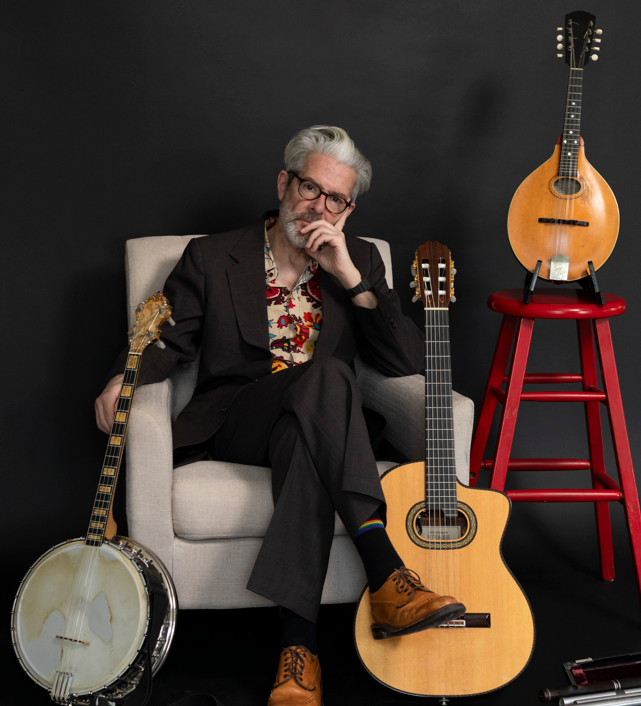IRISH music is luckily always a presence at the Savannah Music Festival, and the debut of Irish “supergroup” Solas is on the bill for this year’s edition.
Comprising a core group of well-known Irish musicians, Solas first hit the scene in the "Celtic Revival" of the mid-1990s, and became known for their powerful stage shows and their open-minded approach to arrangements of the traditional repertoire.
Multi-instrumentalist Séamus Egan plays flute and strings for Solas, and is a founding member. He is probably best-known as co-writer of Sarah McLachlan's hit tune "I Will Remember You," which came out about a year before Egan formed Solas.
While Egan has played with other traditional Irish musicians at the SMF before, this is the first time Solas will grace a local stage.
They play two sets on April 5 at The Metal Building in Trustees' Garden.
We spoke to Séamus Egan last week.
Egan's story is the opposite of the usual tale of the Irish diaspora. He was born in the United States in an Irish family, and then emigrated to Ireland as a youngster.
“My father came to the states as a young man to go to university in Philadelphia. He ended up staying, and met my mother,” explains Egan.
The impetus to return to Ireland was due to Egan's father’s parents living with them in America, and yearning to return home.
“They started getting on in age, and they wanted to go home for their last days – they didn’t want to die in America. So my father packed up the whole family and off we went. We were there about ten years or so,” Egan says.
That was also when Egan was first exposed to traditional Irish music. “That’s when that fire got started,” he says.
Egan's love affair with his main instrument, the traditional Irish flute, began then.
“In Ireland they often put a penny whistle in a child’s hand to see if they have any musical inclination. That’s sort of the cheapest entry point. So I started on tin whistle. From there it was a natural evolution to the flute. At first I didn’t particularly like the flute. It was really difficult.”
The turning point came, he says, when he was at a friend’s house and saw a show on RTE, Irish television.
“The show had Matt Molloy, who played flute with The Bothy Band, and James Galway, the great classical flautist. Just the two of them playing a performance together. Watching them play, that was the moment I knew I wanted to play the flute,” he says.
“I remember bursting through the door to my house and running to the cupboard we kept the flute. That was it. I stayed with the flute from then on.”
Fortuitously, this all happened at one of the most important times in the history of Irish music, concurrent with the so-called “Folk Revival” in the U.S. in the late ‘60s-early ‘70s. Many traditional Irish bands became sensations outside Ireland, gaining a reputation for an aggressive stage presence and innovative approach to expanding traditional instrumentation.
“It was the early ‘70s, so it was a really fortunate time to be getting into Irish music. The Bothy Band was the first concert of Irish music I’d ever gone to, they were playing one town over. It was a very formative experience for me. That’s about when I had something switch on inside me,” says Egan.
After that period in Ireland, Egan says, “We came back to the states, and at first it didn’t make sense to play Irish music outside Ireland. I was like, what’s the point of that? I had no thought of continuing to play.”
The spark was rekindled again when Egan took up that banjo, which at that point had begun being included in Irish ensemble playing.
“The reason I picked up the banjo was that I heard Mick Moloney play. It turned out he’d moved to Philadelphia, where I was living! So I met him, and he sort of took me under his wing.”
Along with the banjo and the bouzouki, Irish groups at that time began incorporation all kinds of newer influences into traditional Irish music. The frame drum called the bodhran also began being played as part of a group onstage really for the first time.
But for Egan, he says the larger innovation was “the whole notion of ensemble playing, really. Playing songs and instrumentals that have been arranged. At that time, musicians were taking notions of arrangement that were way outside Irish tradition prior to that. It was incredibly innovative. It wasn’t just the Chieftains. The Clancy Brothers were probably the first to take those old traditional songs and give the a particular arrangement. That idea really connected with the Folk Revival going on at the same time. That spark went all the way from the U.S. to Ireland.”
The music Solas will be playing in Savannah will mostly hearken back to their first records. They have sharpened their chops on a just-concluded tour, with the SMF performance being the cherry on top.
“We’ve just been five weeks on the road with the reformed Solas. This is my first five-week tour in many a year! It’s heartening to see the turnout,” he says.
“When we were thinking about reforming, of course we had to think about what we would play after such a long stretch of 8 years without playing together. It wasn’t like it usually is, when a band records an album and then tours playing mostly songs off the album. We don’t have a new album. So were felt like the slate was sort of clean," Egan says.
"So we are focusing on that first 25 years of music from early on. It’s been fun to go back that far, and the reaction from the audience has been really appreciative," says Egan.
"Obviously we are all very different people and different musicians now than we were then. We all offer a different layer of experience to the music, and bring a different sensibility and foundation."
Solas play the Savannah Music Festival April 5, 4:30 and 7 p.m., at The Metal Building in Trustees' Garden. Get tix here.

